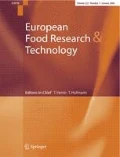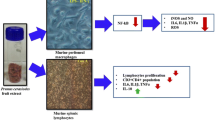Abstract
Coffee is a commonly consumed beverage with potential health benefits. The consumption of coffee has been suggested to have beneficial effects on subclinical inflammation. T helper 17 (Th17) cells, which secrete IL-17, promote protective immunity against extracellular bacteria and fungi, mainly at mucosal surfaces. These cells also promote autoimmune and inflammatory diseases. In the present study, we demonstrated for the first time that coffee suppressed IL-6 plus transforming growth factor-beta-induced Th17 differentiation in vitro. Coffee also inhibited the IL-6-induced phosphorylation of signal transducer and activator of transcription 3, a cytokine-activated essential transcription factor in Th17 development. In order to determine whether daily coffee consumption affected the population of IL-17-producing cells in vivo, healthy mice were provided with 10 g/l coffee or decaffeinated coffee solution for 14 days. The frequency of IL-17-producing cells in both coffee and decaffeinated coffee drinking mice decreased slightly. These results suggest that the suppressive effects of coffee on Th17 differentiation may be useful for controlling unbalanced cytokine networks in autoimmune diseases.




Similar content being viewed by others
References
Charurin P, Ames JM, del Castillo MD (2002) Antioxidant activity of coffee model systems. J Agric Food Chem 50:3751–3756
Lopez-Galilea I, Andriot I, de Pena MP, Cid C, Guichard E (2008) How does roasting process influence the retention of coffee aroma compounds by lyophilized coffee extract? J Food Sci 73:S165–S171
Baker JA, Beehler GP, Sawant AC, Jayaprakash V, McCann SE, Moysich KB (2006) Consumption of coffee, but not black tea, is associated with decreased risk of premenopausal breast cancer. J Nutr 136:166–171
Yamauchi R, Kobayashi M, Matsuda Y, Ojika M, Shigeoka S, Yamamoto Y, Tou Y, Inoue T, Katagiri T, Murai A, Horio F (2010) Coffee and caffeine ameliorate hyperglycemia, fatty liver, and inflammatory adipocytokine expression in spontaneously diabetic KK-Ay mice. J Agric Food Chem 58:5597–5603
Kempf K, Herder C, Erlund I, Kolb H, Martin S, Carstensen M, Koenig W, Sundvall J, Bidel S, Kuha S, Tuomilehto J (2010) Effects of coffee consumption on subclinical inflammation and other risk factors for type 2 diabetes: a clinical trial. Am J Clin Nutr 91:950–957
Harrington LE, Hatton RD, Mangan PR, Turner H, Murphy TL, Murphy KM, Weaver CT (2005) Interleukin 17-producing CD4+ effector T cells develop via a lineage distinct from the T helper type 1 and 2 lineages. Nat Immunol 6:1123–1132
Iwakura Y, Nakae S, Saijo S, Ishigame H (2008) The roles of IL-17A in inflammatory immune responses and host defense against pathogens. Immunol Rev 226:57–79
Bettelli E, Oukka M, Kuchroo VK (2007) T(H)-17 cells in the circle of immunity and autoimmunity. Nat Immunol 8:345–350
Veldhoen M, Hocking RJ, Flavell RA, Stockinger B (2006) Signals mediated by transforming growth factor-beta initiate autoimmune encephalomyelitis, but chronic inflammation is needed to sustain disease. Nat Immunol 7:1151–1156
Mathur AN, Chang HC, Zisoulis DG, Stritesky GL, Yu Q, O’Malley JT, Kapur R, Levy DE, Kansas GS, Kaplan MH (2007) Stat3 and Stat4 direct development of IL-17-secreting Th cells. J Immunol 178:4901–4907
Yang XO, Panopoulos AD, Nurieva R, Chang SH, Wang D, Watowich SS, Dong C (2007) STAT3 regulates cytokine-mediated generation of inflammatory helper T cells. J Biol Chem 282:9358–9363
He P, Noda Y, Sugiyama K (2001) Suppressive effect of coffee on lipopolysaccharide-induced hepatitis in D-galactosamine-sensitized rats. Biosci Biotechnol Biochem 65:1924–1927
Horrigan LA, Kelly JP, Connor TJ (2004) Caffeine suppresses TNF-alpha production via activation of the cyclic AMP/protein kinase A pathway. Int Immunopharmacol 4:1409–1417
Horrigan LA, Kelly JP, Connor TJ (2006) Immunomodulatory effects of caffeine: Friend or foe? Pharmacol Ther 111:877–892
Ritter M, Hohenberger K, Alter P, Herzum M, Tebbe J, Maisch M (2005) Caffeine inhibits cytokine expression in lymphocytes. Cytokine 30:177–181
Lefrancois L, Lycke N (2001) Isolation of mouse small intestinal intraepithelial lymphocytes, Peyer’s patch, and lamina propria cells. Curr Protocols Immunol 3:3–19
Okamoto Y, Tanaka M, Fukui T, Masuzawa T (2012) Brazilian propolis inhibits the differentiation of Th17 cells by inhibition of interleukin-6-induced phosphorylation of signal transducer and activator of transcription 3. Immunopharmacol Immunotoxicol 34:803–809
Camporeale A, Poli V (2012) IL-6, IL-17 and STAT3: a holy trinity in auto-immunity? Front Biosci (Landmark Ed) 17:2306–2326
Nishihara M, Ogura H, Ueda N, Tsuruoka M, Kitabayashi C, Tsuji F, Aono H, Ishihara K, Huseby E, Betz UA, Murakami M, Hirano T (2007) IL-6-gp130-STAT3 in T cells directs the development of IL-17+ Th with a minimum effect on that of Treg in the steady state. Int Immunol 19:695–702
Cardenas C, Quesada AR, Medina MA (2011) Anti-angiogenic and anti-inflammatory properties of kahweol, a coffee diterpene. PLoS One 6:e23407
Fumimoto R, Sakai E, Yamaguchi Y, Sakamoto H, Fukuma Y, Nishishita K, Okamoto K, Tsukuba T (2012) The coffee diterpene kahweol prevents osteoclastogenesis via impairment of NFATc1 expression and blocking of Erk phosphorylation. J Pharmacol Sci 118:479–486
Goto M, Takano-Ishikawa Y, Shinmoto H (2011) An in vitro effect of coffee on the antigen-specific immune responses of naive splenocytes. Biosci Biotechnol Biochem 75:393–395
Kim HG, Kim JY, Hwang YP, Lee KJ, Lee KY, Kim DH, Kim DH, Jeong HG (2006) The coffee diterpene kahweol inhibits tumor necrosis factor-alpha-induced expression of cell adhesion molecules in human endothelial cells. Toxicol Appl Pharmacol 217:332–341
Nosalova G, Prisenznakova L, Paulovicova E, Capek P, Matulova M, Navarini L, Liverani FS (2011) Antitussive and immunomodulating activities of instant coffee arabinogalactan-protein. Int J Biol Macromol 49:493–497
Zhao Z, Shin HS, Satsu H, Totsuka M, Shimizu M (2008) 5-caffeoylquinic acid and caffeic acid down-regulate the oxidative stress- and TNF-alpha-induced secretion of interleukin-8 from Caco-2 cells. J Agric Food Chem 56:3863–3868
Fukushima Y, Kasuga M, Nakao K, Shimomura I, Matsuzawa Y (2009) Effects of coffee on inflammatory cytokine gene expression in mice fed high-fat diets. J Agric Food Chem 57:11100–11105
Goto M, Yamaki K, Shinmoto H, Takano-Ishikawa Y (2009) Continuous orally administered coffee enhanced the antigen-specific Th1 response and reduced allergic development in a TCR-transgenic mice model. Biosci Biotechnol Biochem 73:2439–2444
Ivanov II, McKenzie BS, Zhou L, Tadokoro CE, Lepelley A, Lafaille JJ, Cua DJ, Littman DR (2006) The orphan nuclear receptor RORgammat directs the differentiation program of proinflammatory IL-17+ T helper cells. Cell 126:1121–1133
Atarashi K, Tanoue T, Honda K (2010) Induction of lamina propria Th17 cells by intestinal commensal bacteria. Vaccine 28:8036–8038
Ivanov II, Frutos Rde L, Manel N, Yoshinaga K, Rifkin DB, Sartor RB, Finlay BB, Littman DR (2008) Specific microbiota direct the differentiation of IL-17-producing T-helper cells in the mucosa of the small intestine. Cell Host Microbe 4:337–349
Rocha B, Vassalli P, Guy-Grand D (1991) The V beta repertoire of mouse gut homodimeric alpha CD8+ intraepithelial T cell receptor alpha/beta+ lymphocytes reveals a major extrathymic pathway of T cell differentiation. J Exp Med 173:483–486
Jin W, Dong C (2013) IL-17 cytokines in immunity and inflammation. Emerg Microbes Infect 2:e60. doi:10.1038/emi.2013.1058
Wedebye Schmidt EG, Larsen HL, Kristensen NN, Poulsen SS, Lynge Pedersen AM, Claesson MH, Pedersen AE (2013) TH17 cell induction and effects of IL-17A and IL-17F blockade in experimental colitis. Inflamm Bowel Dis 19:1567–1576
Raychaudhuri SP (2013) Role of IL-17 in psoriasis and psoriatic arthritis. Clin Rev Allergy Immunol 44:183–193
Acknowledgments
The authors would like to acknowledge the financial supports rendered by the All Japan Coffee Association.
Author information
Authors and Affiliations
Corresponding author
Ethics declarations
Conflict of interest
The authors declare no conflict of interest.
Compliance with ethics requirements
The experiments described in this study comply with the institutional ethical guidelines for the care and use of laboratory animals of Chiba Institute of Science.
Rights and permissions
About this article
Cite this article
Okamoto, Y., Hara, T., Itayama, A. et al. Coffee suppresses the differentiation of Th17 cells by inhibiting interleukin-6-induced phosphorylation of signal transducer and activator of transcription 3. Eur Food Res Technol 242, 1141–1148 (2016). https://doi.org/10.1007/s00217-015-2618-4
Received:
Accepted:
Published:
Issue Date:
DOI: https://doi.org/10.1007/s00217-015-2618-4




